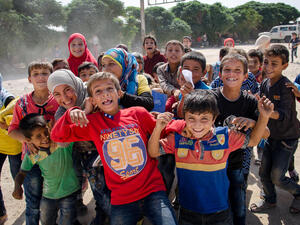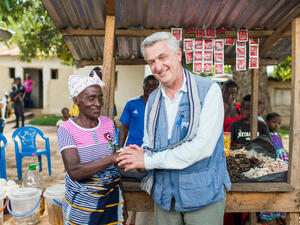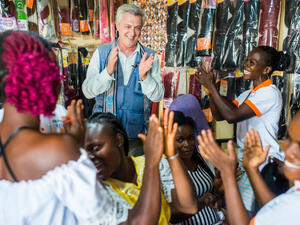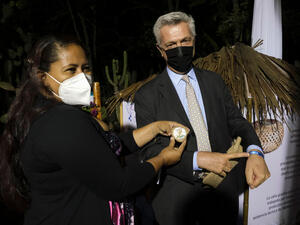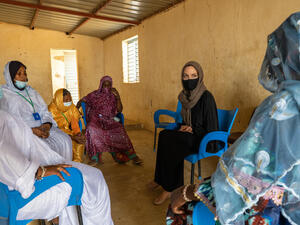'Inclusion is the translation of solidarity into action'
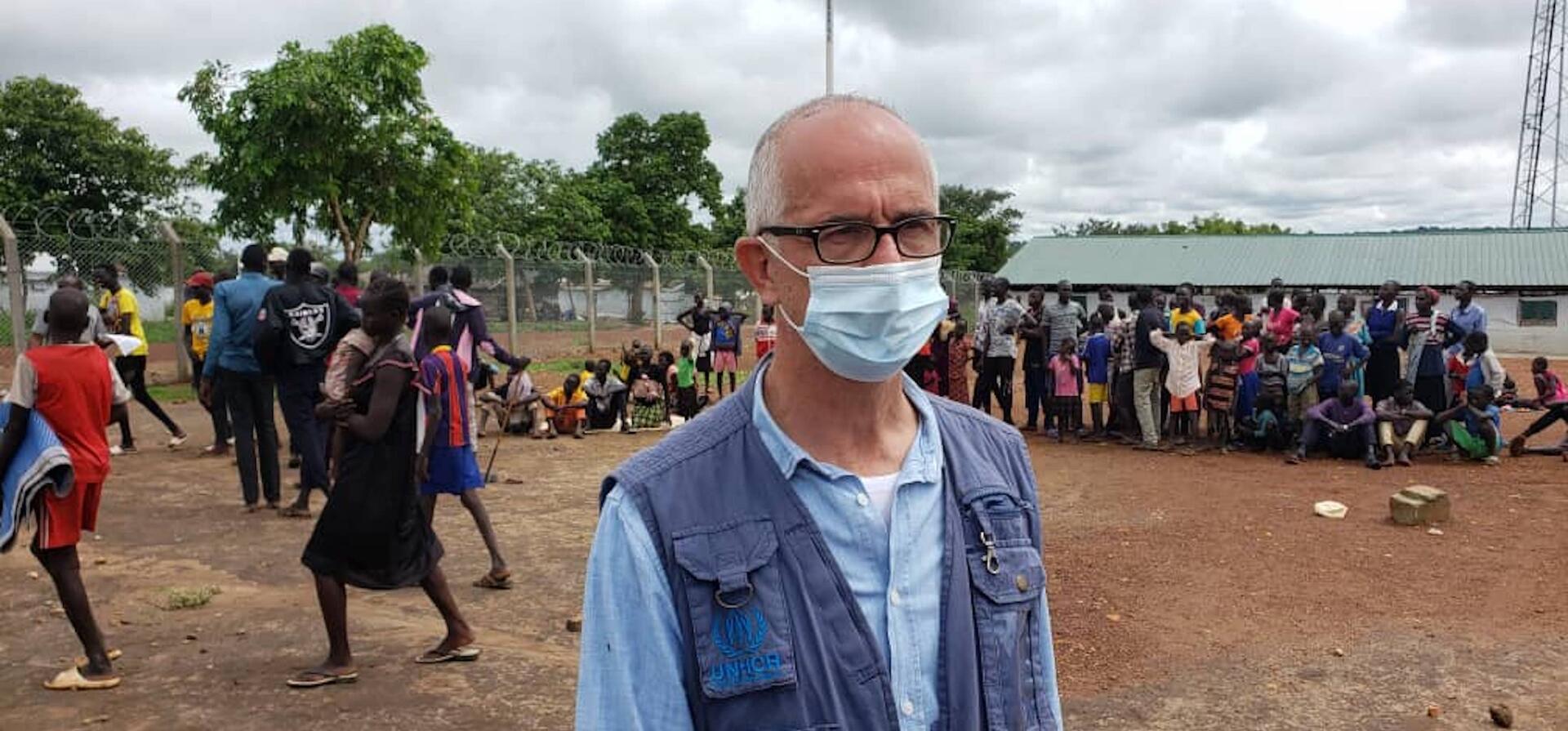
'Inclusion is the translation of solidarity into action'
Conflict and persecution have forced more than 80 million people around the world to flee their homes. According to the 2020 Global Trends Report, Uganda is the fourth largest refugee-hosting country in the world. UNHCR Representative to Uganda, Joel Boutroue shares his insights on the importance of refugee inclusion and the need for more international solidarity to support refugees and their hosting communities.
20 June is World Refugee Day. Does it make sense to celebrate?
World Refugee Day is first a commemoration to remember the ordeal and tragedies millions of refugees face as they are driven from their homes and very often separated from their loved ones. It is a reminder of the failure of the international system to prevent and address the root causes of displacement and a call to action for all of us. But it also a moment to celebrate the lives that we have contributed to save and the resilience of individuals and families who keep hope alive and pursue the dream of a better future. I feel honoured to work with UNHCR and be in a position where I can advocate to help the most vulnerable.
This year’s World Refugee Day theme is inclusion. What does that mean to you?
Inclusion is the translation of solidarity into action. Our duty is to protect the most vulnerable people on this planet. That, the protection of the most vulnerable, is what inclusiveness means to me.
Is refugee inclusion working in the Uganda context and how?
Refugee inclusion is working in Uganda and we must note that this country is a beacon when it comes to refugee policies. Despite the COVID-19 situation, Uganda has continued to welcome refugees. Everyday, we see refugees as a central part of the development dialogue. UNHCR and District Local Governments are actively working on the inclusion of refugees through the refugee response plans. For example, refugee and Ugandan children learn side by side in the national education system as a result of the inclusive policies implemented in Uganda and the Education Response Plan.
Which example of refugee inclusion has made the biggest impression on you and why?
The biggest example of inclusion is the water system in Rwamwanja refugee settlement, Kamwenge district. The water system was constructed by UNHCR and partners and has now been taken over by the National Water and Sewerage Corporation (NWSC). Nationals and refugees are charged the same amount of money per litre of water. The opportunities provided to both the host communities and refugees are the same in this regard.
UNHCR would like to have more social services integrated and will continue supporting the Ugandan government in making this a reality.
What are the biggest challenges and opportunities when it comes to Uganda’s inclusion of refugees?
The biggest challenge is the sheer number of refugees that Uganda is hosting, approximately 1.5 million refugees, spread across 13 districts. Even with the best will and generosity, there is a big risk of fatigue from the host population and government.
Environmental degradation is on the increase – and not because of the refugees, but due to an overall increase of the population in Uganda, which refugees are part of. With more trees being cut for wood-fuel and construction by both refugees and Ugandans, deforestation is now a national challenge. The forest cover has reduced from 32 per cent in the 1980s to about 15 per cent currently. Reforestation is an important intervention, especially in the West Nile region, where the population has significantly increased due to the arrival of over 850,000 over the past four and a half years.
The high number of refugees is also taking a toll on the available resources, despite huge investments made by UNHCR, the World Bank and other partners.
That said, all is not lost. There are opportunities available thanks to the presence of refugees in many parts of the country. Massive investments in social services and infrastructure such as roads, schools, hospitals have been made by partners like the World Bank, benefitting refugees and host communities alike.
The refugees have also learnt to co-exist next to each other, which was not always the case in their countries of origin. There has been an opportunity for an exchange between different groups during displacement, in a way which perhaps was not possible in their countries of origin. The hope is that these new linkages between communities will help foster the transition to peace and their ability to return home one day.
According to the 2020 Global trends Report, Uganda is the fourth largest refugee-hosting country in the world, yet one of the poorest. What’s your reaction?
As an operation, we cannot be satisfied with the current level of funding. Much as services are being provided to refugees, there is need for more resources. Uganda deserves more solidarity from the international community to support refugees hosted on its soil, given its settlement model and approach of looking at refugees as an asset to development. Refugees deserve to see their children go to school, to have access to enough water, adequate healthcare as well as other essential services. As long as these basic needs are not met, it is no wonder that there is an increase in suicide rates, early marriages, and other risky behaviours among the refugees.
With the challenges mentioned, why do the host community continue to be hospitable to refugees?
Some of the older Ugandan generations were refugees at one point or another. So, they know what it is like to be a refugee first-hand and can empathise with the situation of displaced people.
In addition, communities on both sides of the Ugandan borders share common cultures, language, and ethnic ties and most of the refugees are considered to be the brothers and sisters of their Ugandan hosts. They are not regarded as foreigners. However, the generosity of the people of Uganda should not be taken for granted and the dividends of hosting refugees need to be highlighted. In addition, there should be additional support and investment for refugee-hosting districts.
Looking beyond numbers and statistics, what is the one refugee story that made the biggest impression on you?
One refugee who stood out for me is a Congolese man living in Kyangwali refugee settlement. Before coming to Uganda, he was a trader in his home country. When he arrived, he started trading on a small scale and has now grown his business to the level of being able to export goods to the Democratic Republic of the Congo. I was amazed at his level of entrepreneurship and how he managed to turn his life around in a very short time.
You deal everyday with stories of poverty and people in need? What keep motivating you?
Feeling that I am useful in what I do is what keeps me motivated. Being useful to humanity and motivating people to be the best they can be, is what keeps me going.
What is your message to the Ugandan public as the world commemorates World Refugee Day?
I would like to say a big thank you to the Ugandans for their generosity in hosting refugees and sharing their resources. They understand that anybody can be a refugee.
My gratitude goes also to the Government of Uganda for being insightful, by including refugees as part of their development plans.
Despite all the efforts, I regret not being able to secure sufficient resources for refugees in Uganda. However, I would like to assure the country and the host communities in particular that UNHCR will stay and continue to support you, for as long as refugees are here.


